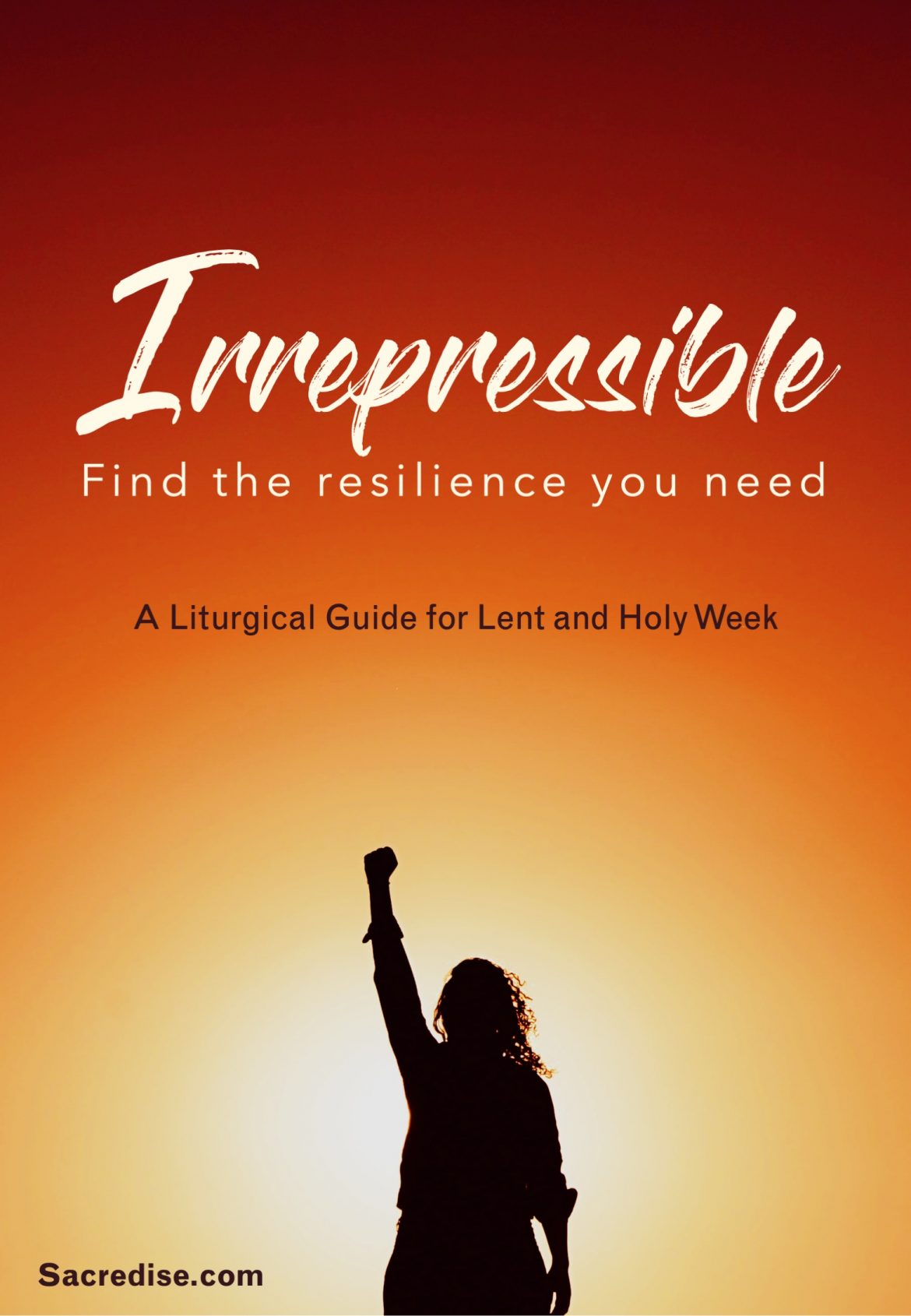by John van de Laar
This article is an excerpt from the new Lent Liturgical and Spiritual Practice guide from Sacredise entitled Irrepressible—How Lent can lead us to resilience. You can find the entire guide in the store at Sacredise.com: https://sacredise.com/irrepressible/
* * *
Today is Ash Wednesday. It is a significant day in the Liturgical Calendar, but I doubt it is one of the most popular celebrations in our faith. Even the word ‘celebration’ seems strangely incongruous when speaking of Ash Wednesday. Traditionally this day is seen to be about confessing sin, acknowledging our mortality, and repenting or changing our ways to be more faithful, obedient, and righteous. It begins the Lenten season, which extends the confession and repentance into a six-week process. Originally, Lent was a time of preparation for baptismal candidates in which they would learn what it means to follow Christ before making their public commitment at their baptism on Easter Sunday.
This is not a bad thing in itself. There is great value in setting aside extended times to reflect on what it means to embrace the way of Christ and live it out more wholeheartedly in our daily lives. But there is also a danger here—at least in how Lent has been observed in my experience of the Church. A faith that makes us feel bad about ourselves is neither healthy nor likely to lead to the kind of positive transformation we seek. But this can easily be the effect of our observance of this season. It is common to hear phrases from our Scriptures and liturgies that reinforce the message that we are worthless sinners who deserve nothing but condemnation:
The worst of sinners
A worm, not a human
Not worthy to gather up the crumbs
Deny yourself
Think of others as better than yourselves
Dust you are and to dust you will return…
There is value in humility, recognising our flaws and brokenness, and committing to becoming more whole and generous. But ironically, the worse we feel about ourselves the less capable we are of doing this important work. We spiral into a deeper brokenness where we feel worthless, incapacitated, and paralysed by our self-loathing and/or self-doubt.
I was raised on Christian teachings about humility, confession, sin, repentance, denying myself and putting others first. It is in my DNA to think of myself as broken, unworthy, and in need of improvement. And I have gained much that I am grateful for in these teachings. But they also did me great harm. In denying myself, I lost my sense of self and allowed myself to become little more than a function of the needs of those around me. In always putting others first, I became empty and lost my capacity for enjoyment and vibrant living. In constantly focussing on what was wrong, inadequate, not-enough, or worthless about myself, I became incapable of seeing my giftedness, my value, my contribution, and my goodness. I allowed myself to be dismissed, humiliated, mistreated, and even abused because I felt that it was wrong to stand up for myself and I always worked hard to see things from the other person’s perspective.
For most of my life, my faith had a very unhealthy impact on my sense of self. It took a long time, but eventually I realised that all this focus on how bad I was did not make me better. I was not more capable of serving others and I was not empowered to contribute more or to make more of a positive impact on my world. Rather, I found myself paralysed, withdrawn, and afraid to step out and show up, because I did not believe I had anything of value to give. I doubted my ideas and visions for doing ministry and I submitted myself to the agendas of my leaders, even when they were self-serving or hurtful to others. A faith that makes us feel less, bad, and unworthy is neither biblical nor spiritual.
But this is not all that Scripture tells us about ourselves. Jesus calls us friends. He claims that bringing abundant life is central to his mission. We are ‘fearfully and wonderfully made’ and God’s good and loving thoughts about us ‘cannot be numbered.’ To love God and our neighbour we must also love ourselves. And we are not just dust. The molecules and atoms within us were born in the cosmos. It is a scientific fact that we are stardust!
For Ash Wednesday—and Lent—to be only about how bad we are, to see repentance only as admitting our sin and committing to be better, is neither healthy nor helpful. And it will not bring about the wholeness, goodness, and willingness to serve and give to others that we seek. It is when we have a vision of our best selves and we feel that we are good and whole—and constantly moving toward greater goodness and wholeness—that we are most able to live full and connected lives.
It is only those who are insecure and who feel inadequate and unworthy that crave the approval of others. These are the play-actors (hypocrites) to whom Jesus refers in his Sermon on the Mount. It is those who know that they are irrepressible (star)dust that don’t need applause. These are the ones who can do their own work of growth and their generous work of serving others in quiet, unassuming ways regardless of the recognition or applause of others. And this is where abundant life is found.
 Looking for resources to embrace Lent? We have several wonderful options available in our shop. Or visit our Lent & Easter Resource Page to find them–from liturgies to activities to inspirational posts to free downloads and more – including the above resource!
Looking for resources to embrace Lent? We have several wonderful options available in our shop. Or visit our Lent & Easter Resource Page to find them–from liturgies to activities to inspirational posts to free downloads and more – including the above resource!

